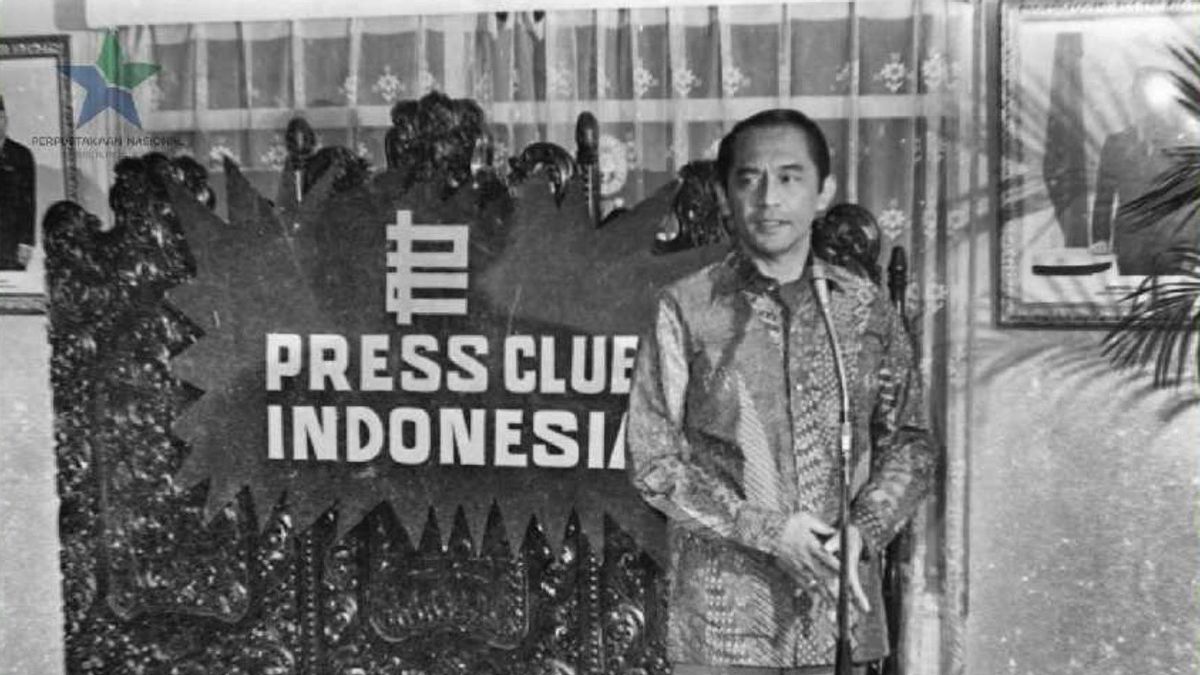JAKARTA - Evictions are part of Jakarta's long history. Since the Dutch era, each leader has contributed to perpetuating the evictions. The narrative of beautifying the city is usually the reason. Even in Ali Sadikin's time. The massive evictions were carried out in the framework of village improvement. One side of the eviction is the answer. On the other hand, his conscience refused. After his term of office, Ali Sadikin apologized to all the evicted victims.
As governor of Jakarta from 1966 to 1977, Ali Sadikin was the only Jakarta leader who launched a village improvement project a la Betawi's Hero, M.H. Thamrin. The Thamrin concept was later adopted by Ali Sadikin.
The project that was originally called Kampung Verbetering during the Dutch era was then continued with the name M.H. Thamrin (MTH) Project. Ali believes that Jakarta is far behind the big cities in Asia. Bangkok, for example. Catching up with this gap, it is considered that Jakarta absolutely needs the MTH project.
Ali Sadikin's insistence on none other than the mushrooming of slum villages in Jakarta. What's more, the village is often the source of disease outbreaks. According to Ali Sadikin, village improvement is seen as a solution to improving health and cleanliness in Jakarta.
Meanwhile, the economic impact, said Ali Sadikin, could follow afterward. In the same breath, Ali used his power to realize the MTH project. He then called the MTH project, which ran from 1968 to the 1970s, as a revolutionary step.
For more details regarding the MTH Project, we have reviewed it in the article "Ali Sadikin Prefers To Improve The Villages Rather Than Build Cheap Houses".
"Having been repaired the village has actually encouraged the residents' efforts to repair their houses. So that this program has multiple results on the improvement of the environment as a whole. In calculating the cost & benefit carried out by the World Bank consultant team, the cost-benefit ratio is far more than one," said Ali Sadikin in the book Gita Jaya (1977).
From eviction to eviction
However, in the course of the MTH project, the poor were worried. It was noted that many lands belonging to Jakarta residents were released during the MTH project. Moreover, for those who have been living in a house without a construction permit (IMB) and those who build a house on land that is not legally entitled.
Take for example those who inhabit "settlements" along the railroad tracks, the banks of the Ciliwung River, flood canals, and green lines. They are the main target. If they are not immediately put in order, the threat is that the law in Indonesia will be played out.
In that sense, the law in question is the law that regulates property rights. Ali Sadikin's fear that if the evictions do not continue, Jakarta residents will no longer be able to distinguish between right and wrong actions.
"Indeed, droves of breadwinners in Jakarta are determined to occupy every inch of vacant land in all corners of the city. It doesn't matter who owns the land. It doesn't even matter that the shelters are in the form of sidewalks or landscaping. Starting with plank walls and roofs, they then build makeshift houses, semi-permanent or also walled. More than that, they also rented out or sold their houses and their land plots to other residents. This kind of incident means inviting more people to Jakarta,” wrote a report from Tempo Magazine entitled Penggeseran: Cerita Lama yang Gusur Terus (1976).

Ali Sadikin had thought about this eviction for a long time. This is because Ali Sadikin himself did not want to deviate from the planned city planology of Jakarta. If you want to save Jakarta, you must build it according to planology.
Nevertheless, the eviction carried out by Ali Sadikin increasingly attracted the attention of many parties. Journalists are one of them. They were skeptical and continued to question Ali Sadikin's attitude which was considered not pro-poor when they were evicted.
"When pressed by journalists who stated that residents in other countries affected by evictions were provided with shelters, even some residents whose houses were evicted (DKI Jakarta government) had certificates and had the title of land ownership, but did not get proper compensation, even though residents knew the evicted were bought by the businessman at a price favorable to Jakarta. Ali Sadikin said: We are facing a serious housing problem (no money)," said Ali Sadikin as quoted by Restu Gunawan in the book Gagalnya Sistem Kanal: Pengendalian Banjir Jakarta dari Masa ke Masa (2010).
Apologize to the evictees
At the end of Ali Sadikin's tenure, he also admitted his mistake in displacing Jakarta residents. According to him, during his tenure, eviction was the most sensible solution in tidying up Jakarta. Ali Sadikin asked the public to understand his duties during his tenure as governor of Jakarta.
He said that as governor, he had to carry out community service duties and fix the city of Jakarta. Although later many linked his policies, including evictions, to favor the rich.
“Every time I ordered an order or eviction, my conscience groaned. Deep down there was something that felt like cursing at me. I felt a mental burden demanding a solution which I was unable to fulfill,” wrote Ali Sadikin himself in the book Ali Sadikin: Membangun dan Menggusur (1977).
Not only that, but Ali Sadikin also believed that the same feelings were also stirring in the minds of those who carried out the eviction order. Whether he is the mayor, security, and order (security and order) apparatus, or the police.
Even Ali Sadikin never dared to see for himself the execution of the eviction order in the field. He revealed that he might be quite strong when facing a million pointing fingers at him. But Ali Sadikin could not bear to see a thousand pairs of resigned eyes from the helpless people.
"Therefore, I can do nothing but apologize profusely, a statement of apology that comes from the bottom of my heart - I say honestly - especially to all those who have been evicted or subjected to law enforcement, and to the security and order (Kamtib) apparatus, state apparatus contrary to their hearts must carry out the task of the evictions," said Ali Sadikin as quoted by Ramadhan K.H. in the book Bang Ali: Demi Jakarta 1966-1977 (1977).
* Read other information about the HISTORY of JAKARTA or read other interesting articles from Detha Arya Tifada.
Other MEMORY
SEE ALSO:
The English, Chinese, Japanese, Arabic, and French versions are automatically generated by the AI. So there may still be inaccuracies in translating, please always see Indonesian as our main language. (system supported by DigitalSiber.id)














